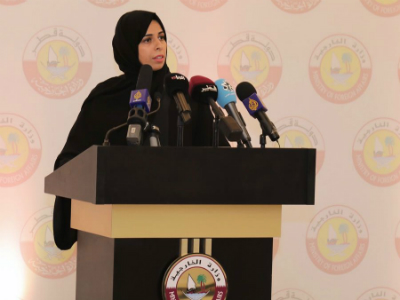Qatar Announces Rejection of US President's Decision on Jerusalem, Warns of Its Consequences

Doha / Information Office / December 13
Official spokesperson for the Ministry of Foreign Affairs Lulwa Al Khater announced the rejection and denouncement of the State of Qatar of the decision of US President Donald Trump to move his country's embassy from Tel Aviv to Jerusalem and declare it the capital of Israel, warning the international community of its consequences and repercussion.
In a press briefing held at the Foreign Ministry on Wednesday evening, Al Khater underlined that the move has no effect on the legal or moral status of the occupied city of Jerusalem, which is in the heart of millions of Muslims and Christians. The move confronts the international legitimacy, including but not limited to the UN Resolution No. (478) of 1980, which stipulates the withdrawal of diplomatic missions from Jerusalem.
The Foreign Minister official spokesperson called on the United States to back down from the decision, which represents an unilateral step that has received a general rejection in international forums, noting that this was evident in the emergency meeting held in the Security Council on December 8, and reflected in the reactions and successive meetings in this regard, the most recent of which was the OIC emergency summit held in Istanbul today.
In response to one of the journalists, Lulwa Al Khater noted that the United Nations resolutions on the Palestinian issue are many and existing, but what is required is to act uniformly at both the Arab and Islamic levels in order to push these decisions into action. This is confirmed by the State of Qatar through its participation in the Arab League or through its participation in Istanbul summit today.
In another context, the Foreign Ministry spokesperson said that the State of Qatar is looking forward to participate in Iraq Reconstruction conference, which will be held in Kuwait in the first quarter of next year, stemming from its commitment to the renaissance of the sisterly Republic of Iraq, asserting that post-ISIS battle is no less serious than fighting the organization.
She expressed the hope that Iraq will restore its strength, unity and prosperity through its people with all their sects and categories, after the announcement by Iraqi Prime Minister Haidar Al Abadi of the end of the war on the ISIS terrorist organization, a news that was received by the State of Qatar with welcome and blessing.
On the other hand, the State of Qatar condemned the bombing of the subway station in New York and stressed that the attack on innocent civilians is a criminal act can not be accepted under any justification.
On the Gulf crisis, the spokesperson highly praised the efforts exerted by the State of Kuwait which were resulted in the convention of the GCC Summit on time. She affirmed that Qatar's participation at the level of leadership reflects the appreciation of the State of Qatar for these efforts and that the mediation of HH the Emir of Kuwait is the umbrella of which Qatar works through, and that this participation aimed to preserve the entity of the GCC from total disintegration.
She stressed that the State of Qatar continues its approach to heal the rift under the umbrella of the honorable mediation of HH the Emir of Kuwait, while it continues to strengthen its strategic partnerships with the various countries of the world to ensure the sustainability of its economy and independence of its decision. She added that the State of Qatar is continuing in all its projects, and although the current is not the best regionally and was not chosen by the State of Qatar, it calls for dialogue and always stresses the importance of the unity of the Gulf entity, and that the State of Qatar will not be a reason to the demolition of the Gulf House and it remains in it.
In response to a question about the increase in Qatar's spending on armaments projects and the signing of several agreements in this regard recently, the Foreign Ministry spokesperson said that most of these agreements are not the result of these days, but refer to bilateral relations extended since before the crisis. What was concluded during the recent period came within the framework of strengthening these relations.

